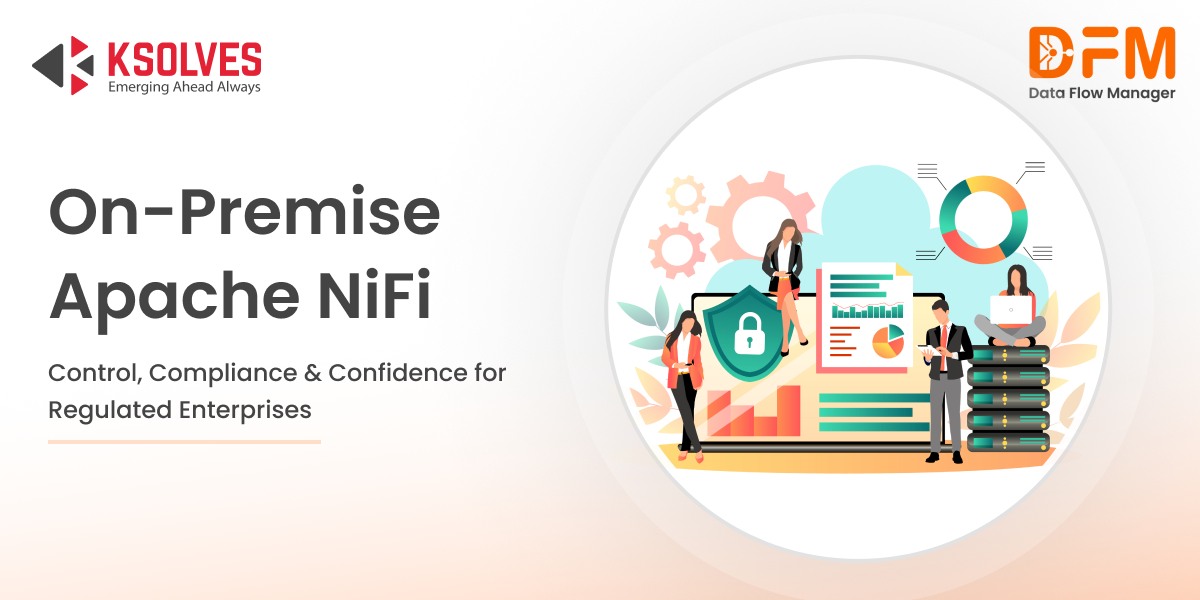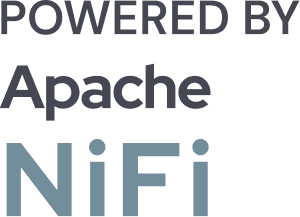When to Choose On-Premise Apache NiFi: A Guide for Highly Regulated Industries
![]()

In today’s digital ecosystem, data is not only a valuable asset. It’s a liability if mishandled. As data volumes surge and integration pipelines grow in complexity, tools like Apache NiFi have become foundational for building secure, scalable, and automated data flows.
However, organizations operating in highly regulated industries, such as healthcare, finance, government, and energy, face unique constraints around data governance, sovereignty, and compliance. The public cloud, though flexible, isn’t always a suitable environment for such sensitive data operations.
This blog explores when on-premise Apache NiFi is the right choice for these industries and how it can help organizations maintain control, ensure compliance, and reduce risk.
Why Highly Regulated Industries Require Greater Control
Organizations operating in highly regulated sectors must adhere to stringent compliance mandates that govern how data is collected, processed, stored, transmitted, and accessed. These mandates are not just technical guidelines; they are legal obligations designed to protect sensitive information and ensure accountability.
- Healthcare providers are subject to regulations like HIPAA in the United States, which mandate strict controls over the confidentiality, integrity, and auditability of patient health information.
- Financial institutions must comply with frameworks such as SOX, PCI-DSS, and GDPR, requiring secure processing of transactions, encrypted storage of customer data, and transparent data governance policies.
- Government agencies operate under frameworks like FISMA, FedRAMP, and data localization laws, which often restrict data from being transmitted beyond national borders or into public cloud environments.
- Energy and utility companies must meet standards like NERC-CIP, which enforce rigorous controls over data related to critical infrastructure, ensuring operational continuity and national security.
In these industries, regulatory non-compliance can lead to substantial fines, legal exposure, operational disruption, and irreparable damage to public trust. As a result, complete control and visibility across the entire data pipeline, from data ingestion to delivery, are not just desirable; they are essential.
Cloud vs. On-Premise NiFi: Key Differences
While Apache NiFi is platform-agnostic and can run on both cloud and on-premise environments, there are fundamental differences that impact its suitability in regulated contexts:
| Features | Cloud NiFi | On-Premise NiFi |
| Data Residency | May store/process data globally | Data remains within the local infrastructure |
| Security Control | Shared responsibility with the provider | Complete internal governance |
| Network Dependency | Requires reliable internet | Operates in isolated environments |
| Latency | Can be affected by network delays | Optimized for real-time, local processing |
| Customization | Limited by vendor environments | Fully customizable to internal policies |
For organizations with stringent data sovereignty and compliance requirements, on-premise NiFi often becomes the default choice.
Also read: Why Should Enterprises Opt for On-Premises Over Cloud for Data Infrastructure
When On-Premise NiFi is the Right Fit
Below are the key scenarios where on-premise NiFi becomes not just a preference, but a necessity.
1. Strict Regulatory Requirements
Organizations that undergo regular audits or must comply with stringent data governance standards need complete control over their data flows. With on-premise NiFi, organizations can:
- Maintain full audit trails to track data lineage and transformations.
- Enforce internal access controls aligned with corporate and regulatory policies.
- Ensure localized storage of personally identifiable information (PII), reducing the risk of data exposure in multi-tenant or off-site environments.
This level of transparency and control is crucial for meeting compliance mandates in healthcare, finance, and government sectors.
2. Air-Gapped or Isolated Environments
In high-security environments, such as defense installations, nuclear facilities, or classified research centers, external connectivity is either severely restricted or completely prohibited. On-premise NiFi is ideal for these air-gapped deployments, allowing secure data ingestion, routing, and processing without ever touching the public internet.
3. Custom Security Policies
Public cloud services often come with standardized security features, which may not be flexible enough for regulated enterprises. On-premise NiFi allows organizations to implement:
- Custom SSL certificate handling to meet internal PKI requirements.
- Advanced encryption standards tailored to industry-specific protocols.
- On-site key and token management, ensuring critical credentials never leave the organization’s control.
This level of customization is essential for organizations with advanced or non-standard security policies.
4. Low-Latency Processing Requirements
For industries that rely on real-time operations, like manufacturing, utilities, or transportation, network latency can disrupt business continuity. On-premise NiFi enables:
- Local data ingestion and transformation without relying on internet bandwidth.
- Immediate response and decision-making, especially in time-sensitive environments like power grids or production lines.
By processing data closer to the source, organizations can reduce delays and maintain operational efficiency.
5. Integration with Legacy Systems
Many regulated enterprises still operate critical workloads on legacy infrastructure that is difficult or impossible to migrate to the cloud. On-premise NiFi seamlessly connects with:
- Mainframe applications
- Local SCADA (Supervisory Control and Data Acquisition) systems
- On-site relational databases and file systems
This makes it a powerful solution for organizations with long technology refresh cycles or those dependent on complex, mature ecosystems.
Challenges with On-Premise NiFi
While on-premise NiFi provides control and compliance, it does introduce some operational complexities:
- Infrastructure Setup & Maintenance: Requires provisioning, scaling, and securing hardware and software environments.
- Manual Flow Deployment: Promoting data flows across environments like Development, UAT, and Production can be time-consuming and error-prone.
- Multi-Cluster Management: Enterprises with regional installations may face challenges in synchronizing and monitoring NiFi clusters.
Without automation and centralized governance, managing on-premise deployments can become resource-intensive.
Overcoming On-Premise NiFi Operational Overhead with Data Flow Manager (DFM)
Data Flow Manager (DFM) is a centralized, code-free platform to design, deploy, monitor, and govern NiFi flows – all without using the traditional NiFi UI and writing complex scripts.
Here’s how DFM reduces the operational overhead of on-premise NiFi:
- Deploy and promote NiFi flows across clusters in minutes.
- AI-powered NiFi flow creation
- Rollback-ready flow deployments
- Schedule flow deployments
- Role-based access control
- End-to-end cluster management
It bridges the gap between operational agility and regulatory compliance, especially for enterprises that require stringent change control processes.
Final Considerations
When evaluating whether on-premise NiFi is the right fit, organizations should reflect on a few critical questions:
- Are we processing highly sensitive, confidential, or classified data?
- Are we subject to national regulations or industry-specific compliance mandates?
- Do we require complete control over our data integration pipelines, infrastructure, and security policies?
If the answer to any of these is yes, then an on-premise deployment of NiFi is not just a viable option – it may be a strategic necessity.
Conclusion
In a world where data privacy is under increasing scrutiny, regulated industries cannot afford compromises. On-premise Apache NiFi gives organizations the sovereignty and control they need while enabling real-time, low-latency, and policy-compliant data integration.
When paired with tools like Data Flow Manager, organizations can overcome the operational challenges of on-premise setups while maintaining the agility of modern DevOps practices. Start your free trial!
![]()

